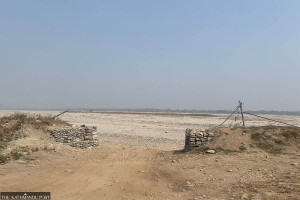Koshi Province
Bahundangi gets early warning system to tackle elephant menace
The early warning system sets off a siren after detecting the movement of elephants and also notifies locals through the ‘Hatti Ayo’ mobile application.
Parbat Portel
The Bahundangi area in Mechinagar Municipality-4, in Jhapa, home to around 1,800 households, regularly makes headlines for its human-animal conflict problem. Wild animals, especially elephants, have been terrorising this border countryside for decades. Elephants enter the village from India crossing the Mechi River, locals say, and kill people and cause massive destruction to the properties.
Locals usually come to know of elephant menace only after much physical and human damage has been done. That is now about to change. With the recent instalment of an early warning system, the locals will get the news of elephant movement immediately. The EWS sets off a siren upon the pachyderm’s arrival, and a notification will also be sent to the locals through a mobile application called ‘Hatti Aayo’, which literally means an elephant has entered.
Wild elephant attacks have been a perennial problem at the bordering villages of Jhapa with the number of pachyderms entering Nepal from India increasing every year. In the last ten years, at least 53 people have died in elephant attacks while 13 elephants have been killed in the period, according to the Division Forest Office, Jhapa.
According to the Mechinagar municipal office, the siren and application have been donated by a non-profit organisation called Ujyalo Nepal. Sirens worth about Rs 60,000 were installed at the initiative of Mechinagar Municipality-4, on August 27, and the application was made public on August 14. The Armed Police Force’s border outpost has been given the responsibility of maintaining and operating the siren.
“Siren, which can be heard in the radius of 1km, has been installed to inform locals who don’t have a phone of elephant arrival, so they can prepare themselves,” said Ramesh Thapa, former warden of Bardiya National Park and former president of Ujyalo Nepal.
According to Thapa, after the notification of the arrival of elephants, human lives can be saved and damage can be reduced. This is also expected to gradually change the behaviour of humans towards elephants, Thapa said, which will also help to maintain the coexistence of both humans and animals.
Earlier this year, on June 20, residents of Mechinagar Municipality in Jhapa physically abused an elephant calf separated from its herd. Thapa believes that such incidents should not repeat; humans, he said, should not hurt animals and behave like animals themselves.
According to Arjun Kumar Karki, ward chairman of Mechinagar Municipality-4, last month, the organisation sent eight locals including Pawan Baraili, a ward member, to the Bardia National Park for elephant conservation training.
This team will send information to every settlement and village that are at risk through the app and also help the locals in critical situations. The houses in the affected areas will also be insured through Ujyalo Nepal within a couple of days.
“There is also a demand that the victims should get immediate relief from their insurance. And sirens will be installed in two other places soon,” Karki said.
Even now, many locals have not been able to get relief for the physical damage caused by the elephants. The government has been providing Rs 10,000 for physical damage caused by wild animals.
But that’s not enough, locals say. In fact, Shankar Luitel, a middle-aged man, said that he had to spend nearly Rs15,000 in order to get Rs10,000 relief money provided by the government. For the relief amount, people have to reach the district headquarters which is 40km away from Bahundangi.
Ramesh Kumar Yadav, head of Koshi Wildlife Reserve, said that the amount of damage caused by wild animals should be increased to at least Rs50,000. The role of local people is important to maintain the coexistence of both elephants and humans, he said.
Birendra Gautam, an official at the National Trust for Nature Conservation, said that elephants are vindictive creatures, very dangerous in every manner. “Once they get angry, they only get more aggressive,” he said. “People should gradually change their attitude and behaviour towards elephants, which will reduce the damage to both sides. It’d be good if the early warning system helps in that respect.”




 10.4°C Kathmandu
10.4°C Kathmandu











